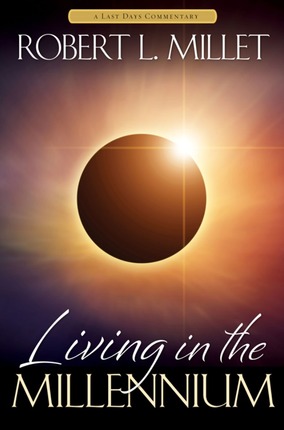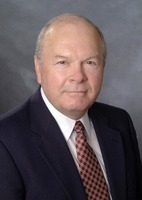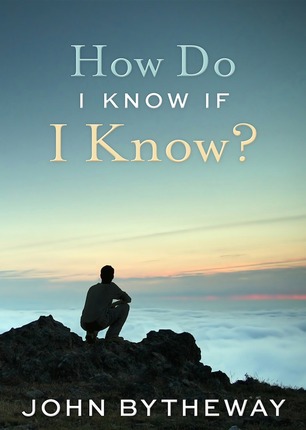I received this book for free from Deseret Book in exchange for an honest review. This does not affect my opinion of the book or the content of my review.

The Savior taught through the Prophet Joseph Smith that the time will come when "he that liveth in righteousness shall be changed in the twinkling of an eye, and the earth shall pass away so as by fire" (Doctrine and Covenants 43:32).
What do we know about that day when Jesus Christ will come in glory to cleanse the earth? And what will life be like after He comes to reign?
In Living in the Millennium, the companion volume to Living in the Eleventh Hour, author Robert L. Millet opens the doors wide to show us what life will be like during and after the Millennium. Relying on the words of ancient and modern prophets, he shares what has been revealed about Christ's preliminary appearances, His return in majesty and power, and His millennial reign—a thousand years of goodness and peace.
Filled with insights, this timely book helps us to understand more fully such eternal doctrines as the resurrection of the just and the unjust, the Judgment, and the many mansions of glory.
Living in the Millennium inspires us to live today as if the Savior were coming tomorrow.
This is a companion book to Robert L Millett’s Living in the Eleventh Hour published earlier this year. What I really appreciate about Living in the Millenium is the scriptural basis. Brother Millett takes a purely doctrinal approach to explaining to readers what life will be like before, during, and beyond the Millenium. I had previously heard many of the scriptures by themselves, but seeing them organized and combined into one reference taught me in a clear manner. Millett’s tone is hopeful and cheery, however, he also admits to personal trials, the wonderings and hardships that come with mortality. I loved reading about how the author overcame worry, and felt the peace that comes with the Lord’s assurances of the resurrection. For anyone with questions about the second coming of Christ, life after death, how our bodies become whole or what the reign of peace will be like, this book holds answers.
In the end, there is a glossary, notes, scripture and subject index for readers to truly “dig in” and learn the teaching firsthand. A short read, this Last Days Commentary will help each individual and touched my heart personally.

Favorite Quote
Seeing things with an eye of faith is looking out and beyond to the distant scene, viewing today’s often repetitious and sometimes monotonous coming and goings with an eye toward eternity. It is to see beyond the moment, to acquire a portion of God’s perspective, to realize that “out of small things proceedeth that which is great”. (D&C 64:33) p. 103
Excerpt
Chapter 1
The End of Time
I was driving to work one day and turned the radio to an oldies channel, where I heard a familiar song from the 1960s, a tender ballad, a love song. Over and over the artist sang of love lasting until the end of time. Later that afternoon I listened to the same channel and heard another artist pledging his love until time stood still. I smiled as I reflected on the message of those two popular songs, realizing how very often such sentiments are sung or how frequently a romantic sentiment is expressed in just that way. I presume the writers of these words intended to convey some meaning like “l love you forever and ever” or “There will never be a time when I no longer love you.”
The more I have thought about it, the more fully I realize that from a Restoration perspective, love is intended to last longer than time, to span the veil of death and continue everlastingly. For those without such understanding, however, “till time stands still” or “to the end of time” seems like a pretty significant and long-term investment of one’s love. Let’s consider this passage of scripture: “And the angel which I saw stand upon the sea and upon the earth lifted up his hand to heaven, and sware by him that liveth for ever and ever, who created heaven, and the things that therein are, and the earth, and the things that therein are, and the sea, and the things which are therein, that there should be time no longer” (Revelation 10:5-6; emphasis added; see D&C 88:108-10).
As a part of the new song that is to be sung by the redeemed are these words:
The Lord hath brought again Zion;
The Lord hath redeemed his people, Israel,
According to the election of grace,
Which was brought to pass by the faith
And covenant of their fathers.
The Lord hath redeemed his people;
And Satan is bound and time is no longer.
(D&C 84:99-100; emphasis added)
We are told in the Doctrine and Covenants that “it is required of the Lord, at the hand of every steward, to render an account of his stewardship, both in time and in eternity. For he who is faithful and wise in time is accounted worthy to inherit the mansions prepared for him of my Father” (D&C 72:3-4).
I presume there will always be what might be called durational time, the fact that event A took place before event B, or that we declared C before we uttered D. What the scriptures seem to be saying, however, when they speak of time being no longer is that mortal time, or mortality, will be no longer. That is, a day is coming in the not too distant future when mortality as we know it will be no more; we will no longer be reckoning our words and our actions according to this world’s calendar but rather we will be tuned and acclimated to eternity.
We have been counseled by the prophets to improve our time, that is, to make wise and effective use of the day in which we live on earth, for how we will spend eternity will be inextricably linked to how we spent our time in this life. And so we are told that “this life is the time for men to prepare to meet God; yea, behold the day of this life is the day for men to perform their labors” (Alma 34:32).
What will life be like when mortal time is no more? We can learn from holy scripture and latter-day apostles and prophets about the following:
the private appearances of Jesus Christ to his anointed servants;
that great and terrible day we know as the Savior’s coming in glory;
the cleansing of the earth by fire and the transformation of the planet;
life on a terrestrial earth;
a day when the gathering of Israel, accomplished through our missionary labors, will be unhindered and thus accelerated;
a glorious time when temples will dot the earth and the fulness of the blessings of the house of the Lord will be enjoyed by the pure in heart in every nation;
a time when persons will again begin to deny their God, when Satan will be loosed for a short season;
when the final great battle between good and evil will take place;
the miracle and wonder of our resurrection from the dead;
the day of judgment, when all will be required to account for how they handled their stewardship of time; and,
life within the kingdoms of glory, the many mansions of the Father.
Concerning the specifics of the future, details do matter, but they need to come from the right source—from holy scripture or from latter-day apostles and prophets. For me or for any other writer or teacher to go beyond what ancient or modern prophets have declared, to set forth private views concerning the last days, whether based upon individual interpretations or personal spiritual experience, is to assume a responsibility that is not ours; it is to act outside our stewardship. The ideas may be fascinating, even entertaining, but they are not from God; the Lord simply does not operate that way. To do so would be to invite every member of the Church to step forward, offer his or her own best guess about the days ahead, and thereby engender chaos. The Lord’s house is a house of order, not a house of confusion. There are channels to follow, and we must recognize those channels. Therein is our safety from deception. The Prophet Joseph Smith stated the principle as follows:“I will inform you that it is contrary to the economy of God for any member of the Church, or any one, to receive instruction for those in authority, higher than themselves; therefore you will see the impropriety of giving heed to them; but if any person have a vision or a visitation from a heavenly messenger, it must be for his own benefit and instruction; for the fundamental principles, government, and doctrine of the Church are vested in the keys of the kingdom.”
I have therefore chosen to quote more extensively from holy scripture and from the writings and sermons of apostles and prophets than I am generally accustomed to doing. Although I do not wish to burden the reader with excessive support and substantiation, I do want to be as doctrinally sound and as loyal to the Lord’s anointed as I can.
Operating in harmony with such restraint, let us proceed on our journey. And what a journey it will be! What an encounter will be ours as we make our way through the prophetic word and contemplate the glories that await the true and faithful. Looking to the future will do much to motivate us to get our lives in order while we are still living in time, for eternity is just around the corner. In addition, a view of the future can fortify us against the discouragement that inevitably follows from the pain and distresses of this fallen world; it provides us with a perspective that produces gospel gladness.
Notes
1. Smith, History of the Church, 1:338; emphasis added.
About the Author
Robert L. Millet, an Abraham O. Smoot Professor and former dean of Religious Education at Brigham Young University, is a professor of ancient scripture and a lifelong scholar of the last days. After receiving bachelor’s and master’s degrees from BYU in psychology, he earned a PhD from Florida State University in religious studies. He has served in The Church of Jesus Christ of Latter-day Saints as a seminary teacher, bishop, stake president, and member of the Materials Evaluation Committee. He and his wife, Shauna, are the parents of six children.


 Carey Corp wrote her first book, a brilliant retelling of Star Wars, at the prodigious age of seven. Since then, her love affair of reinvention has continued to run amuck. Writing both literary fiction and stories for young adults, she begins each morning consuming copious amounts of coffee while weaving stories that capture her exhaustive imagination. She harbors a voracious passion (in no consistent order) for mohawks, Italy, musical theater, chocolate, and Jane Austen. Her debut novel for teens, The Halo Chronicles: The Guardian, earned her national recognition as 2010 Golden Heart finalist for best young adult fiction. Coming August 20, 2013: Doon (book 1 of the DOON series), a young adult novel loosely based on the concept of the musical Brigadoon, used with permission from the Alan Jay Lerner Estate & the Frederick Loewe Foundation, and co-written with Lorie Langdon.
Carey Corp wrote her first book, a brilliant retelling of Star Wars, at the prodigious age of seven. Since then, her love affair of reinvention has continued to run amuck. Writing both literary fiction and stories for young adults, she begins each morning consuming copious amounts of coffee while weaving stories that capture her exhaustive imagination. She harbors a voracious passion (in no consistent order) for mohawks, Italy, musical theater, chocolate, and Jane Austen. Her debut novel for teens, The Halo Chronicles: The Guardian, earned her national recognition as 2010 Golden Heart finalist for best young adult fiction. Coming August 20, 2013: Doon (book 1 of the DOON series), a young adult novel loosely based on the concept of the musical Brigadoon, used with permission from the Alan Jay Lerner Estate & the Frederick Loewe Foundation, and co-written with Lorie Langdon. A few years ago, Lorie Langdon left her thriving corporate career with a Fortune 500 company to satisfy the voices in her head. Now as a full-time author and stay-at-home mom, she spends her summers editing poolside while dodging automatic water-gun fire, and the rest of the year tucked into her cozy office, Havanese puppy by her side, working to translate her effusive imagination into the written word. Her co-written four-book series, DOON, a YA reimagining of the Scottish legend of Brigadoon, will release beginning in August 2013 from Zondervan/Harper Collins.
A few years ago, Lorie Langdon left her thriving corporate career with a Fortune 500 company to satisfy the voices in her head. Now as a full-time author and stay-at-home mom, she spends her summers editing poolside while dodging automatic water-gun fire, and the rest of the year tucked into her cozy office, Havanese puppy by her side, working to translate her effusive imagination into the written word. Her co-written four-book series, DOON, a YA reimagining of the Scottish legend of Brigadoon, will release beginning in August 2013 from Zondervan/Harper Collins.











































